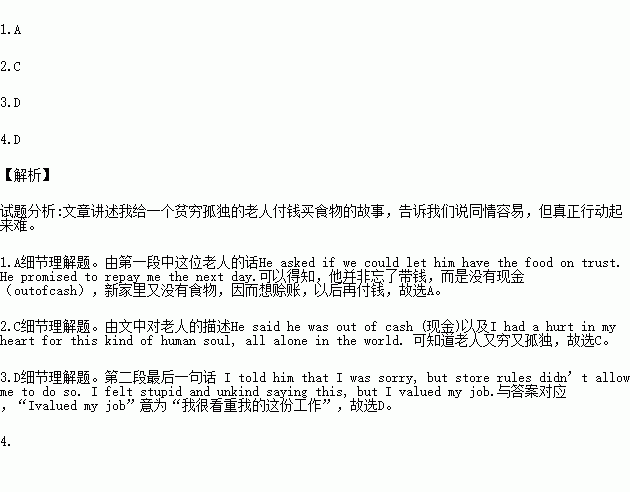题目内容
Compassion(同情,怜悯) is a desire within us to help others. With effort, we can translate compassion into actions. An experience last weekend showed me this is true. I work part-time in a supermarket across from a building for the elderly. These old people are our main customers, and it’s not hard to lose patience over their slowness. But last Sunday, one aged gentleman appeared to teach me a valuable lesson. This untidy man walked up to my register(收款机)with a box of biscuits. He said he was out of cash (现金), had just moved into his room, and had nothing in his cupboards. He asked if we could let him have the food on trust. He promised to repay me the next day.
I couldn’t help staring at him. I wondered what kind of person he had been ten or twenty years before, and what he would be like if luck had gone his way. I had a hurt in my heart for this kind of human soul, all alone in the world. I told him that I was sorry, but store rules didn’t allow me to do so. I felt stupid and unkind saying this, but I valued my job.
Just then, another man, standing behind the first, spoke up. If anything, he looked more pitiable. “Change it to me, ” was all he said.
What I had been feeling was pity. Pity is soft and safe and easy. Compassion, on the other hand, is caring in action. I thanked the second man but told him that was not allowed either. Then I reached into my pocket and paid for the biscuits myself. I reached into my pocket because these two men had reached into my heart and taught me compassion.
1.The aged gentleman who wanted to buy the biscuits_________ .
A.hoped to have the food first and pay later
B.promised to obey the store rules
C.forgot to take any money with him
D.could not afford anything more expensive
2.Which of the following best describes the old gentleman?
A.kind and lucky B.friendly and helpful
C.poor and lonely D.hurt and disappointed
3.The writer acted according to the store rules because_________ .
A.he felt no pity for the old gentleman
B.he considered the old man dishonest
C.he expected someone else to pay for the old man
D.he wanted to keep his present job
4.What does the writer learn from his experience?
A.Wealth is more important than anything else
B.Experience is better gained through practice
C.Obeying the rules means more than compassion.
D.Helping others is easier said than done
 亮点激活精编提优100分大试卷系列答案
亮点激活精编提优100分大试卷系列答案

